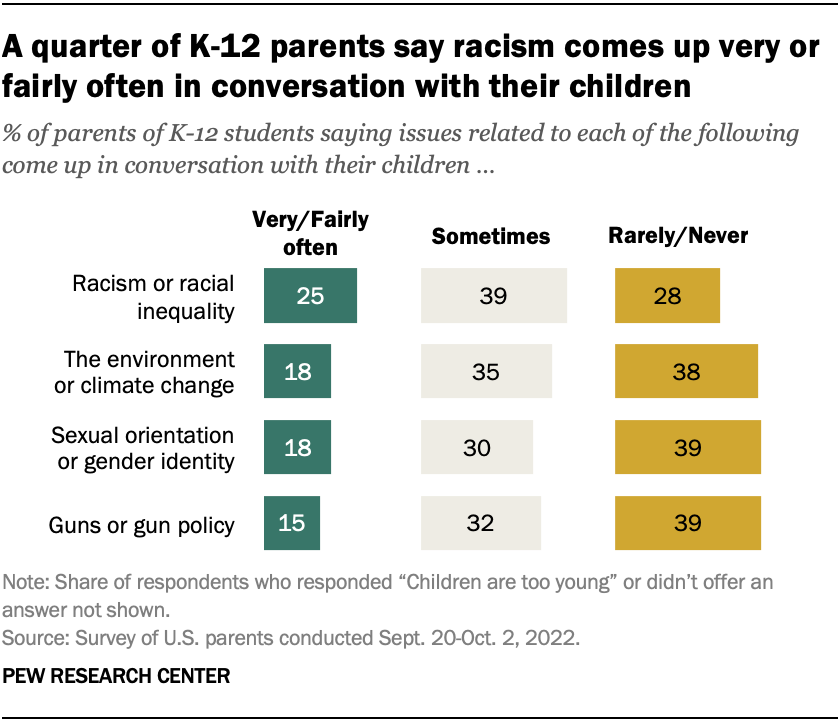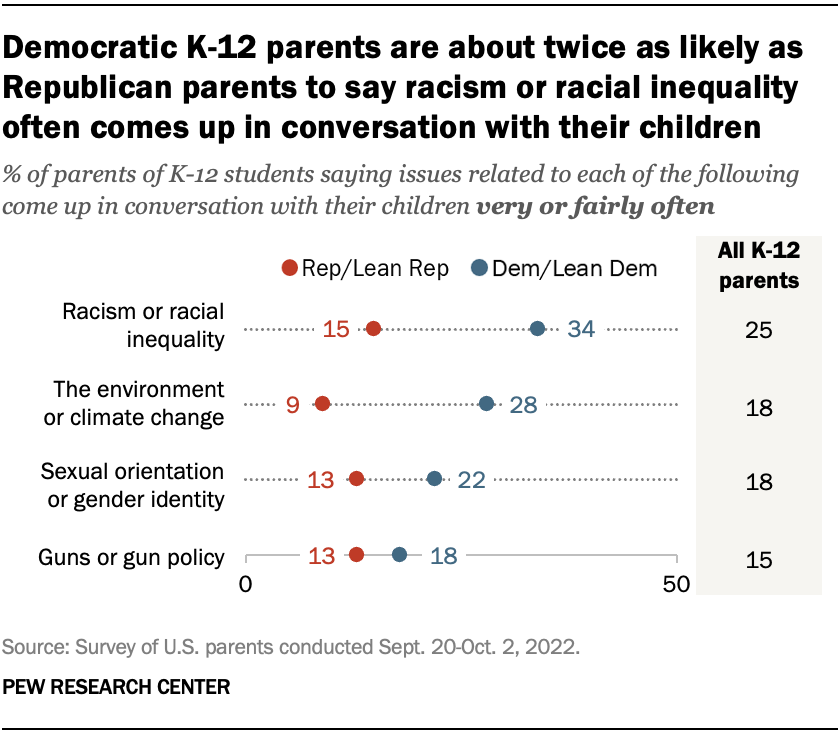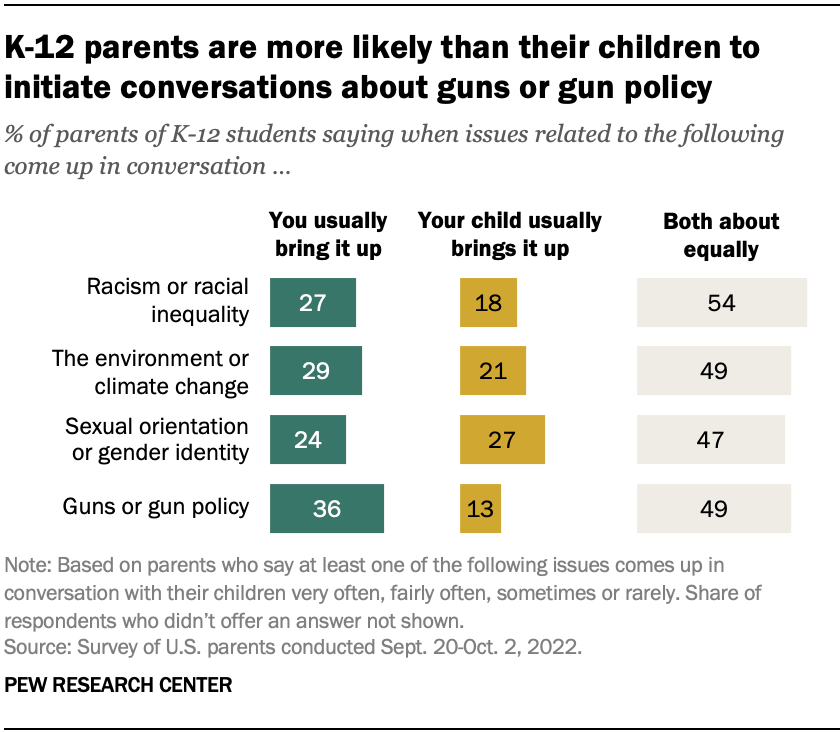
Issues that have been at the center of national debates in recent months are also topics of conversation for some parents and their children. But there are wide partisan divides in how often these topics come up in conversation, according to a Pew Research Center survey of parents.
Overall, a quarter of parents of K-12 students in the United States say racism or racial inequality comes up in conversations with their children very or fairly often. About one-in-five (18%) say they and their children discuss the environment or climate change with the same frequency, and the same share say this about the topic of sexual orientation or gender identity. Some 15% of K-12 parents say guns or gun policy comes up at least fairly often with their K-12 children in conversation.
Pew Research Center conducted this analysis to study the extent to which U.S. parents and their K-12 children discuss certain national issues and who initiates those conversations. To do this, we surveyed 3,757 U.S. parents with at least one child younger than 18, including 3,251 U.S. parents of K-12 students, from Sept. 20 to Oct. 2, 2022. The questions in this analysis were only asked of parents with children ages 5 and older. Therefore, these findings exclude 55 parents with children younger than age 5 in K-12 schools (about 2% of K-12 parents). Most parents who took part are members of the Center’s American Trends Panel (ATP), an online survey panel that is recruited through national, random sampling of residential addresses. This survey also included an oversample of Black, Hispanic and Asian parents from Ipsos’ KnowledgePanel, another probability-based online survey web panel recruited primarily through national, random sampling of residential addresses.
Address-based sampling ensures that nearly all U.S. adults have a chance of selection. The survey is weighted to be representative of the U.S. adult population by gender, race, ethnicity, partisan affiliation, education and other categories. Read more about the ATP’s methodology.
Here are the questions used for the report, along with responses, and its methodology.
For three of these four topics – all except racism or racial inequality – larger shares of parents say the issue rarely or never comes up in conversation than say it comes up very or fairly often. Meanwhile, between 7% to 13% of parents say their children are too young to discuss these issues.

Democratic K-12 parents and those who lean toward the Democratic Party are more likely than Republican and GOP-leaning parents to say each of these topics comes up in conversation with their K-12 children very or fairly often. For example, Democratic parents are about twice as likely as Republicans (34% vs. 15%) to say racism or racial inequality comes up in conversation with their children very or fairly often. And at a time when attitudes about climate change are deeply divided by party, Democratic parents are about three times as likely as Republicans (28% vs. 9%) to say they discuss the environment or climate change with their children often. In fact, about half of Republican parents (52%) say this topic rarely or never comes up in conversation with their children, compared with a quarter of Democratic parents.
When it comes to sexual orientation or gender identity, about one-in-five Democratic K-12 parents (22%) say it comes up very or fairly often in conversation with their kids, compared with 13% of Republicans. A similar pattern exists for guns or gun policy.
See also: Parents Differ Sharply by Party Over What Their K-12 Children Should Learn in School
Black and Hispanic parents (35% and 28%, respectively) with children in grades K-12 are more likely than White parents (21%) to say racism or racial inequality comes up very or fairly often in conversations with their children. Asian parents fall somewhere in the middle on this topic; about a quarter (26%) say the same.
Among Democratic parents, those who are White, Black and Hispanic are about equally likely to say they discuss racism or racial inequality with their children at least fairly often, but Black Democratic parents are the most likely to say this comes up very often. One-in-five Black Democratic parents say this, compared with 8% of those who are White and 12% of those who are Hispanic. (The sample size for Asian Democratic parents with K-12 children is too small for separate analysis, as is the sample size for Black and Asian Republican parents.)
The overall pattern is similar for guns and gun policy. About one-in-five Black (19%) and Hispanic (22%) parents discuss these topics with their K-12 children very or fairly often, compared with 13% of White parents and 11% of Asian parents. However, the racial and ethnic differences on this issue remain when looking only at Democratic parents.
Mothers and fathers also differ in how often they discuss two of the four issues included in the survey. Mothers are more likely than fathers to say racism or racial inequality comes up very or fairly often in conversation with their children (28% vs. 21%). Fathers (34%) are more likely than mothers (24%) to say this rarely or never comes up.
When it comes to sexual orientation or gender identity, 21% of mothers say it comes up very or fairly often, compared with 14% of fathers. Nearly half of fathers (46%) say this rarely or never comes up, compared with a third of mothers.
Children’s ages also play a role in how often these issues come up in conversation. This is especially true on the topic of sexual orientation or gender identity: A quarter of K-12 parents with at least one teenager say this topic comes up very or fairly often, compared with only 9% of parents whose oldest child is ages 5 to 12. On the subject of racism or racial inequality, three-in-ten K-12 parents with a teenager say this comes up at least fairly often, compared with 19% of parents whose oldest child is ages 5 to 12. A similar pattern exists for guns or gun policy and the environment and climate change.
Who initiates conversations, parents or their children?
For parents who say they discuss these issues with their children, the Center’s recent survey also asked who initiates those conversations – parents or their kids.

For all four issues, pluralities of parents say they and their children are about equally likely to do so. But the topic that parents are most likely to bring up themselves is guns or gun policy. Among K-12 parents who discuss this topic with any of their children, 36% say they usually bring it up. About half (49%) say it’s brought up about equally between themselves and their children, while only 13% say their children bring the topic up in discussion first.
Among K-12 parents who say racism or racial inequality ever comes up in conversation, about a quarter (27%) say they usually bring it up. Roughly one-in-five parents (18%) say their children bring it up, and more than half (54%) say it’s about equal. For parents who discuss sexual orientation or gender identity with their children, about a quarter (27%) say their children usually initiate the conversation – a significantly higher share than the other topics asked about in the survey. For the environment or climate change, about three-in-ten parents (29%) say they bring it up the topic, while about one-in-five (21%) say their child usually brings it up.
For the most part, mothers and fathers give similar answers about who typically brings up each of these topics. But fathers are more likely than mothers to say that when the topic of guns or gun policy comes up, they – and not their children – usually initiate the conversation. (Read the topline for more details.)
Note: Here are the questions used for the report, along with responses, and its methodology.



